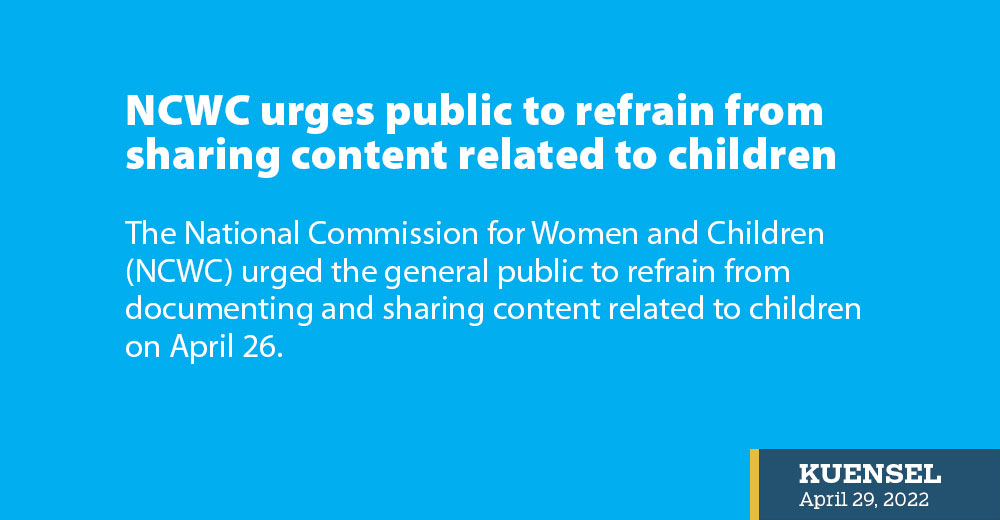… people question whether NCWC and other agencies are protecting the children
Choki Wangmo | Tsirang
The National Commission for Women and Children (NCWC) urged the general public to refrain from documenting and sharing content related to children on April 26.
The notification came after a video went viral on Facebook related to children in the Tsirang molestation case.
The 12-minute long video features an interviewer asking students about the conflict among the officiating principal of a school, who was convicted of molesting 10 students, DB Chhetri, a contract teacher, Ugyen Zangmo, and another teacher, Tshering Tobgay, before the molestation case surfaced in the school in 2019.
Students, with their faces blurred, were made to recount the event and how they were coerced by Ugyen Zangmo to accuse DB Chettri. Few parents also alleged the children were forced to give statements without parents’ consent in the video.
NCWC, in the public appeal, stated that they observed increasing incidents of calling or visiting, interviewing, and sharing videos or recordings or images of children, including voice recordings in both mainstream and social media by the general public.
“While the NCWC respects the freedom of choice of individuals to express their views, it is emphasised that these acts are not in the best interest of the child and could lead to further re-victimisation,” it stated.
Such examples, according to the notification, can hamper survivors of similar violence from seeking support, creating a culture of violence acceptance and fear of reporting. “Failure to abide by this notification shall be dealt as per the Child Care and Protection Act of Bhutan 2011.”
However, parents of the children involved said the video was filmed in 2019 a week after DB Chhetri was arrested and not recently as implied by NCWC.
“We did not know who filmed the video and wasn’t even aware that it was online,” a parent said.
She said that with the recent resurfacing of the case, some children are undergoing trauma. “One of the girls refuses to go to school because she said that the environment is not secure.”
Most of the 10 girls are currently in classes V and VI studying in the same school.
The school principal, however, said that as it was an old case and there were no visible signs of trauma in the students involved. “As of now, I believe we don’t have any issues and general psychological impact on our children. We have 100 percent attendance.”
During his tenure, the principal said that none of the 10 affected children sought counselling services.
A teacher who has been in the same school since 2019 said that he did not notice any absenteeism in the school and the students seemed normal. “The teachers, however, do not have time to attend and observe the behaviour of each child.”
While most of the netizens supported the video and said the case should be reinvestigated, some questioned the authenticity of the video.
“The interviewer asked leading questions and students seemed to read the answers,” a source, who followed the case closely said.
A corporate employee questioned what NCWC and other relevant agencies have done to protect the interest of the children besides issuing the public notification.
She said most of the online contents of the case violate Child Care and Protection Act of Bhutan 2011, which mandates protecting the identity of the children and also the safety of the children. “NCWC and other relevant organisations should ensure the children are safe.”
It was learnt no agencies or officials approached the children or the parents about how they are coping with the issue today.
NCWC’s focal in Tsirang said she is new and is not aware of the case.
She also said she did not receive any queries or requests from the victims or their parents.
Meanwhile, it was learnt three parents of the children involved submitted an appeal letter to His Majesty’s Secretariat on April 25 to reinvestigate the case.


